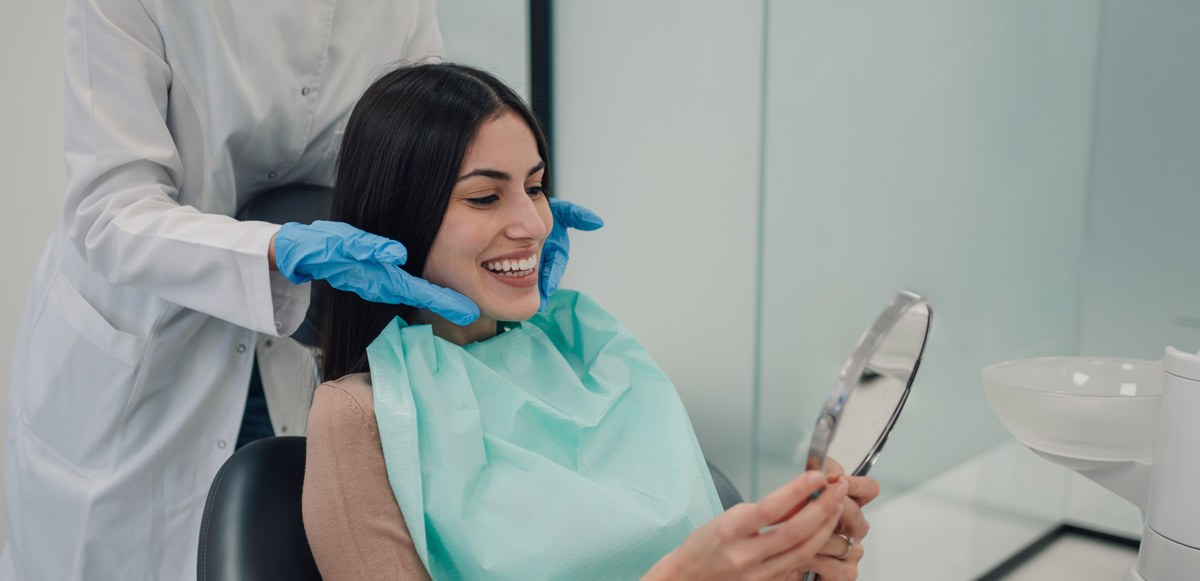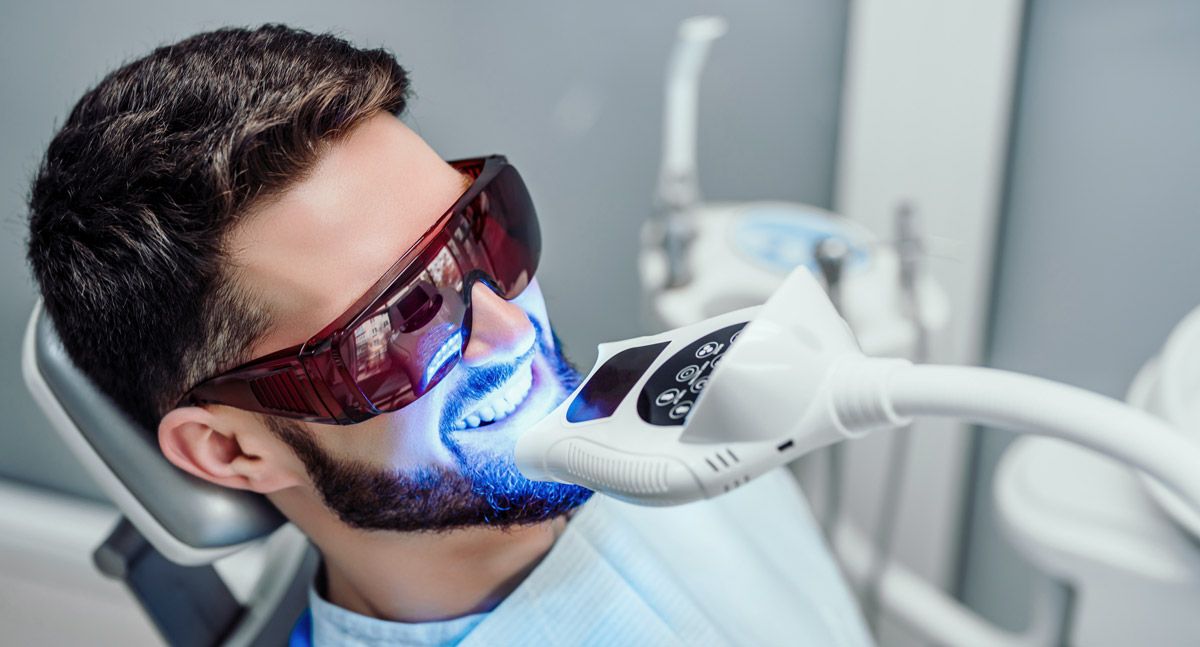What to expect when you see a dentist for whitening teeth

If you’re considering visiting a dentist for whitening teeth, you’re not alone. Professional teeth whitening is one of the most popular cosmetic dentistry treatments in the UK today.
While there are many whitening kits and bleaching products available over the counter, seeing a regulated dental professional ensures safety, effectiveness and long-lasting results.
This guide walks you through everything you need to know, from the initial consultation to aftercare, and helps you understand what to expect from a tooth whitening treatment.
Understanding teeth whitening
What is teeth whitening?
Teeth whitening is a cosmetic procedure designed to lighten the existing colour of your natural teeth. It does not make teeth brilliant white but can improve the appearance by several shades. Professional teeth whitening involves bleaching, typically using a whitening agent like hydrogen peroxide or carbamide peroxide, to whiten teeth safely under the care of a dental professional.
Unlike whitening toothpaste, which can remove only surface stains, professional whitening works below the enamel. This means the results are more noticeable and longer-lasting. Many people choose this option to improve confidence and achieve a healthier, whiter smile.
How does teeth whitening work? The science behind the smile
Tooth whitening treatment works by applying a bleaching gel to the teeth. This gel breaks down and releases oxygen into the tooth enamel, helping to lighten the natural colour without damaging the surface. The process can be performed either in-chair at the dental clinic or through home teeth whitening kits prescribed by your dentist.
The concentration of the whitening product used by your dentist is stronger than what you can purchase in shops or online. This is why whitening procedures should only be carried out by a registered dental professional. When done correctly, it is safe and highly effective.
Choosing the right dentist
Can any dentist whiten teeth?
Not every dentist can perform tooth whitening treatment.
In the UK, only a registered dental professional such as a dentist, dental hygienist, dental therapist or clinical dental technician working to a dentist’s prescription is allowed to carry out teeth whitening. This regulation is in place to protect patients, as whitening involves bleaching agents like hydrogen peroxide or carbamide peroxide, which must be used safely to avoid damage to the gums and tooth enamel.
Additionally, teeth whitening is not available on the NHS (unless in exceptional circumstances), so you will more than likely need to pay to have this treatment with a private dentist.
Always ensure your treatment is provided by a regulated dental professional to guarantee both safety and effectiveness.
Questions to ask before booking a consultation
Before starting a whitening treatment, ask your dentist whether the procedure is suitable for you. Questions might include:
- Will the treatment work on all your teeth?
- How long will the results last?
- What risks are involved?
- What kind of whitening product will be used?
- Is a dental professional present during the procedure?
These questions help set realistic expectations and ensure that you are fully informed before committing to the procedure. Your dentist may also review your lifestyle habits, such as whether you drink red wine or smoke, as these can influence how long your teeth stay whiter after treatment.
The initial consultation
Assessing suitability for whitening
During your initial consultation, your dentist will examine your oral health to determine if you’re a good candidate for whitening. Conditions like gum disease, tooth decay or existing restorations such as crowns or fillings might affect whether teeth whitening is appropriate. Very few people are unsuitable, but an assessment ensures the treatment is both safe and effective.
Your dentist may also photograph your teeth and compare shades using a colour guide. This helps track progress and measure how many shades lighter your teeth become after treatment. This visual record can also be useful for managing expectations.
Discussing expectations and potential outcomes
Your dentist will discuss what kind of results to expect, which depends on the natural colour of your teeth and any staining. Teeth whitening results vary from person to person, but most patients can expect their teeth to lighten by several shades. The dentist will also inform you about how long your teeth stay whiter, which can be up to three years with proper care.
It is important to understand that teeth whitening will not work on false teeth, veneers, crowns, or fillings. The whitening effect only works on naturally healthy teeth, and the shade of other restorations may need to be adjusted afterwards for an even appearance.
The whitening process
In-chair (laser or light-activated) whitening
This type of professional teeth whitening is done at the dental clinic. The dentist applies a strong bleaching gel and may use a special light to activate the whitening agent. The entire treatment period usually lasts about an hour, and results can be seen immediately. This is one of the fastest ways to get a brighter smile.
In-chair whitening is ideal for people who want quick results for a special occasion or those who prefer not to handle whitening kits at home. A regulated dental professional will monitor the procedure to protect your gums and minimise any risk to tooth enamel.
Custom take-home trays and gels
Home whitening trays are another common method. Your dentist will take impressions to create custom trays and provide a whitening gel to use at home over several days or weeks. This method allows gradual whitening and often results in a more natural finish. It’s important that these home kits are issued by a regulated dental professional to ensure safety and effectiveness.
Home teeth whitening offers flexibility and is often more budget-friendly. Your dentist will give you clear instructions on how to use the trays and how long to wear them each day. Most patients see results within one to two weeks.
Aftercare and results
Managing sensitivity and side effects
Tooth sensitivity is a common side effect of whitening procedures, especially if you already have sensitive teeth. Your dentist may recommend a whitening toothpaste designed for sensitive teeth or spacing out treatments. Avoiding acidic foods and drinks like red wine can also help reduce discomfort.
If you experience irritation of the gums, inform your dentist. This can happen if the trays do not fit properly or if too much whitening gel is used. Professional supervision helps prevent these issues.
How long results typically last
Teeth whitening is not permanent. How long the whitening effect lasts depends on your habits and oral hygiene. Drinking red wine, coffee, or smoking can stain your teeth more quickly. With good care, teeth whitening results can last up to three years. Using whitening toothpaste and following the dentist’s advice can help your whiter teeth last longer.
It is also advisable to maintain regular check-ups with your dentist and have cleanings with your dental hygienist to remove surface stains and preserve the whitening effect.
Things to consider before treatment
Costs and time commitments
Whitening procedures can vary in cost depending on the type and provider. In-chair treatments usually cost more but offer faster results. Home trays may take longer but are often more affordable. Discuss the full treatment plan with your dentist, including any follow-up appointments and maintenance tips.
Some dentists offer whitening as part of a broader cosmetic dentistry package. If you are considering other enhancements, such as straightening or veneers, ask whether whitening should come first to match your natural teeth to your new look.
Risks, myths, and realistic expectations
While professional whitening is safe under the supervision of a dental professional, it’s not suitable for everyone and does carry risks if done improperly.
Avoid using whitening kits from beauty salons or unlicensed providers, as they may damage your tooth enamel or gums. Whitening cannot change the colour of false teeth or other restorations, and it won’t make all your teeth exactly the same shade.
Teeth whitening FAQs often stress that results depend on the existing colour of your teeth and how well you maintain your oral health after treatment.
Whitening treatments will not give you the best teeth overnight. Most patients require multiple sessions or consistent at-home applications over a period of time. The goal is a whiter smile that looks natural and complements your overall appearance, not an artificial or unnatural shade.
Come to Fulham Road Dental for top-quality professional teeth whitening treatment
At Fulham Road Dental, we are committed to helping you achieve a brighter, healthier smile with safe and effective professional teeth whitening treatment. Our experienced team of highly trained dental professionals will tailor your whitening plan to suit your individual needs and ensure the process is both comfortable and effective.
We take the time to assess your oral health, explain every step of the treatment, and provide expert advice on maintaining your results. Whether you are looking for noticeable results in a short time or prefer the convenience of a home-based option, we are here to support you with professional care throughout your whitening journey.
Book your consultation with Fulham Road Dental today and discover how we can help you achieve a whiter smile with complete confidence.


